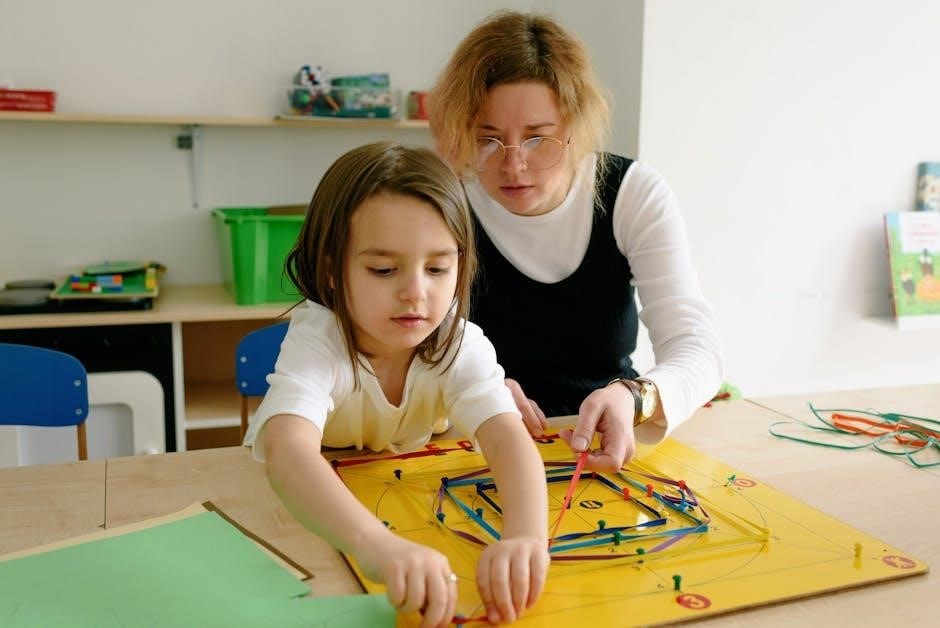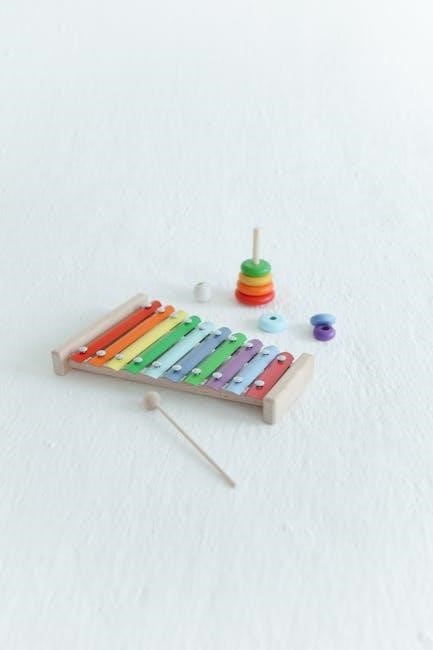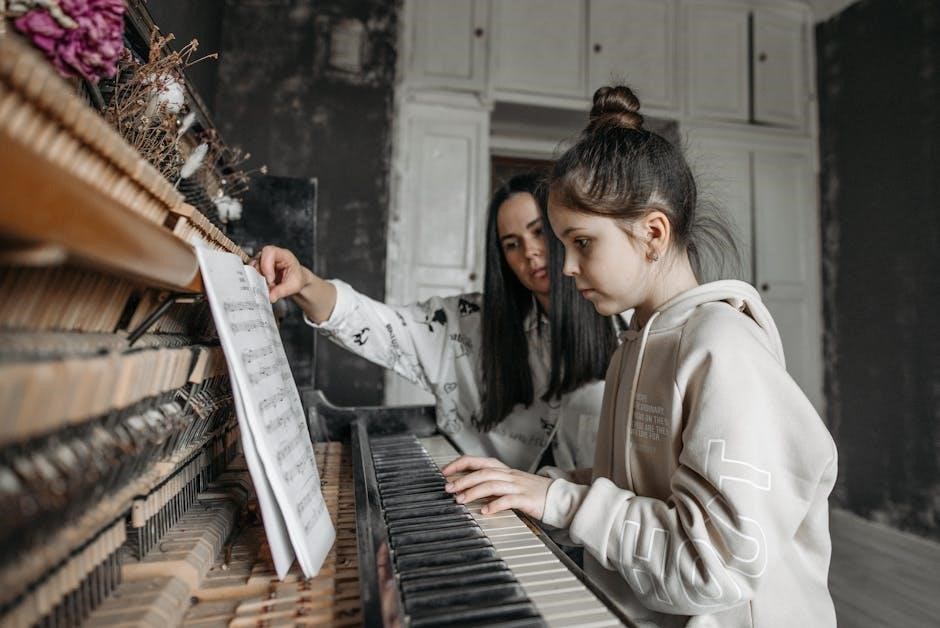Preschool music lesson plans PDFs offer structured activities, including songs, dances, and instrument exploration, designed to foster creativity and engagement in early childhood development through music․
1․1 Importance of Music in Early Childhood Development

Music plays a vital role in early childhood development, fostering creativity, self-expression, and emotional intelligence․ It enhances motor skills through rhythm and movement, while also improving language development and memory․ Engaging in musical activities helps preschoolers develop social skills, as they learn to collaborate and communicate through shared experiences․ Music also provides a foundation for academic success, strengthening problem-solving abilities and concentration․ Additionally, it offers a universal language that connects diverse cultures and backgrounds, promoting inclusivity and understanding․ By incorporating music into daily routines, educators and parents can create a nurturing environment that supports holistic growth and prepares young learners for future challenges․
1․2 Benefits of Structured Music Lesson Plans for Preschoolers
Structured music lesson plans provide a clear framework for teaching preschoolers, ensuring consistent skill development and engagement․ These plans help children build foundational music skills, such as rhythm, melody recognition, and motor coordination, through organized activities․ They also foster creativity and self-expression, encouraging young learners to explore music confidently․ By incorporating repetition and progression, structured lessons enhance memory retention and understanding․ Additionally, these plans promote social interaction and teamwork, as children participate in group singing, dancing, and instrument play․ For educators, structured plans offer time-saving organization and alignment with learning objectives, ensuring a balanced and enriching musical experience for preschoolers․

Structure of a Preschool Music Lesson Plan
A typical preschool music lesson plan includes opening songs, movement activities, instrument exploration, and repetition of familiar tunes to maintain engagement and foster learning through play․

2․1 Opening Activities: Songs and Warm-Ups
Opening activities in preschool music lesson plans PDFs often include simple songs and warm-ups to engage students and set a positive tone․ These activities, such as call-and-response games or clap-along rhythms, help children transition into a musical mindset․ Many plans incorporate movement-based warm-ups to connect music with physical activity, fostering coordination and creativity․ Repetition of familiar tunes encourages participation and helps young learners build confidence․ These initial exercises are designed to be short, lively, and accessible, ensuring even the youngest participants can join in․ By starting with enjoyable and interactive elements, teachers can capture students’ attention and create a foundation for further musical exploration․
2․2 Movement and Dance: Engaging Young Students

Preschool music lesson plans PDFs frequently integrate movement and dance to captivate young learners, promoting physical expression and creativity․ Action songs, dance parties, and guided movements encourage children to explore rhythm and tempo through their bodies․ Activities like spinning, clapping, or jumping to music help develop coordination and self-awareness․ Many plans include free-form dance sessions, allowing children to express emotions and ideas freely․ Movement-based games, such as follow-the-leader or freeze dance, add an element of fun while teaching musical concepts․ These exercises are designed to be simple, energetic, and inclusive, ensuring all students can participate and enjoy the process of learning through music and motion․
Preschool music lesson plans PDFs often emphasize instrument exploration as a key component of early musical education․ Simple instruments like tambourines, maracas, and xylophones are introduced to spark curiosity and creativity․ Activities include shaking, tapping, and experimenting with sounds, allowing children to develop their sense of rhythm and timing․ Many plans incorporate group instrument play, encouraging collaboration and listening skills․ Teachers guide students in replicating sounds and patterns, fostering an understanding of musical elements․ These hands-on experiences help build fine motor skills and confidence, while making music-making accessible and enjoyable for young learners․ Instrument exploration is a vibrant way to connect music theory with practical, engaging activities․

Themed Music Lesson Plans
Themed music lesson plans PDFs create engaging experiences, such as seasonal celebrations or animal adventures, to captivate young learners and connect music with their everyday interests creatively․
3․1 Seasonal and Holiday-Themed Lessons
Seasonal and holiday-themed music lessons for preschoolers are a delightful way to engage young learners․ These lesson plans often include festive songs, dances, and crafts that align with specific holidays or seasons․ For example, winter-themed lessons might feature songs like “Let it Snow” or “Jingle Bells,” paired with movement activities that mimic snowflakes or sleigh bells; Similarly, spring-themed lessons could incorporate songs about flowers or rain, with corresponding instrument exploration using simple instruments like tambourines or maracas․ These themed lessons not only foster creativity but also help children connect music to their everyday experiences․ Many free PDF resources are available online, offering structured yet flexible plans that cater to different skill levels and classroom dynamics․ By incorporating seasonal elements, teachers can make music lessons more relatable and fun, ensuring that preschoolers remain captivated and eager to participate․ These themed activities also provide opportunities for storytelling, art projects, and parent involvement, making music education a holistic experience․ With downloadable materials and easy-to-follow instructions, educators can seamlessly integrate seasonal themes into their music curriculum, creating memorable learning moments for their students․
3․2 Animal-Themed Music Activities

Animal-themed music activities are a fun and engaging way to introduce preschoolers to the world of music․ These lessons often include songs about animals, such as “Old MacDonald Had a Farm” or “The Animal Fair,” which encourage children to imitate animal sounds and movements․ Activities may involve creating rhythms using simple instruments like drums or shakers to mimic animal footsteps or calls․ Movement-based games, like “If You’re Happy and You Know It” adapted with animal actions, also promote physical expression․ Some lesson plans incorporate storytelling through music, where children act out animal stories using songs and sound effects․ These activities not only develop musical skills but also foster creativity and an appreciation for nature․ Many free PDF resources offer printable materials and step-by-step guides for teachers and parents to implement these themed lessons effectively․

Interactive Music Activities
Interactive music activities engage preschoolers through singing games, action songs, and storytelling, fostering creativity and musical awareness while encouraging active participation and joyful learning․
4․1 Singing Games and Action Songs
Singing games and action songs are engaging activities that captivate preschoolers, fostering musical exploration and physical movement․ These activities, often found in preschool music lesson plans PDFs, encourage children to participate actively, promoting creativity and teamwork․ Simple songs with actions, like “If You’re Happy and You Know It” or “The Wheels on the Bus,” help develop motor skills and coordination․ These interactive experiences also enhance memory and language development as children follow directions and imitate movements․ Educators can incorporate free printable resources, such as song sheets and activity guides, to create structured yet fun learning opportunities․ Repeating these activities over multiple lessons reinforces learning and builds confidence in young musicians․
4․2 Storytelling Through Music
Storytelling through music is a captivating way to engage preschoolers, combining narrative with melody and rhythm․ Preschool music lesson plans PDFs often include activities where songs and instrumental pieces are woven into stories, fostering imagination and emotional connection․ Educators use songs with lyrics that tell tales, such as “The Alphabet Song” or “Old MacDonald Had a Farm,” to introduce literacy and sequence․ Movement and simple instruments can enhance the narrative, allowing children to act out stories or create sound effects․ These activities not only entertain but also help develop memory, creativity, and language skills․ Free printable resources, like story-based song sheets, make it easy for teachers to incorporate storytelling into their music classes, enriching the learning experience for young students․

Assessment and Progress Tracking
Preschool music lesson plans PDFs include strategies for observing participation, engagement, and creativity․ Teachers track progress through informal assessments, noting improvements in rhythm, singing, and movement skills over time․
5․1 Observing Student Participation and Engagement
Preschool music lesson plans PDFs emphasize the importance of observing students during activities to assess their engagement and participation․ Teachers can track progress by noting enthusiasm, creativity, and willingness to join in songs, dances, or instrument play․ Simple checklists or anecdotal records can be used to document individual and group involvement․ Encouraging active participation helps build confidence and a love for music․ Observations also reveal areas where students may need additional support or encouragement․ By making assessments fun and integrated into lessons, teachers ensure a natural and stress-free evaluation process, fostering a positive learning environment for young children․ This approach helps guide future lesson planning and reinforces musical concepts effectively․
5․2 Involving Parents in Music Education
Preschool music lesson plans PDFs often include strategies to engage parents in their child’s musical journey․ Sharing printable materials and activity guides allows parents to reinforce learning at home․ Teachers can provide song sheets, rhythm games, and simple instruments for family participation․ Workshops or newsletters can educate parents on the benefits of music education․ Encouraging parents to attend music sessions or share their own musical traditions fosters a collaborative environment․ By involving parents, teachers create a seamless transition between classroom and home, enhancing the child’s musical development․ This partnership strengthens the child’s engagement and love for music, making it a shared, enjoyable experience for the whole family․

Resources for Preschool Music Lesson Plans
Preschool music lesson plans PDFs provide accessible resources, including free printable materials, online platforms, and communities, offering teachers and parents engaging tools for early childhood music education․
6․1 Free PDF Downloads and Printable Materials
Free preschool music lesson plans PDFs are widely available, offering a variety of engaging activities tailored for young learners․ These downloadable resources include printable sheet music, sing-along songs, and movement-based exercises․ Many plans incorporate arts and crafts, making music education interactive and fun․ Teachers and parents can find structured 20-minute lessons, perfect for maintaining children’s attention spans․ Some PDFs focus on specific skills, such as rhythm, pitch, and self-expression through dance․ Programs like Prodigies offer colorful, engaging materials that combine music with visual aids․ These free resources are designed to be adaptable, catering to different classroom dynamics and learning objectives, ensuring music education is accessible and enjoyable for all preschoolers․
6․2 Online Platforms and Communities for Music Teachers
Online platforms and communities offer invaluable support for preschool music teachers, providing access to shared resources and expertise․ Websites like Prodigies and Teach Preschool Music host extensive libraries of lesson plans, videos, and printable materials․ These platforms often feature forums where educators can exchange ideas and gain inspiration․ The Early Childhood Music Hub is another notable resource, offering expert-led courses and downloadable activities․ Many platforms cater to both experienced teachers and newcomers, ensuring a welcoming environment for professional growth․ By joining these communities, music educators can access a wealth of diverse teaching styles and stay updated on innovative methods to engage young learners․ These resources help create a vibrant, collaborative space for music education․
